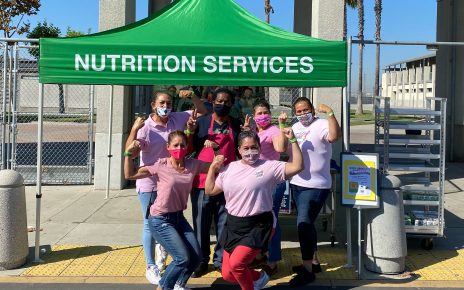Years from now, when I am telling the story of the COVID-19 shutdown to my future students, I will struggle to capture the way in which the news was both incremental and sudden, both inevitable and completely unexpected.
My students — 10th, 11th, and 12th graders at Jordan High in North Long Beach — had been asking me for days about the news they were seeing online. I’d even told them to start preparing mentally for schools to close down. When the local colleges and universities started moving to remote learning, followed close behind by some of the other large school districts, I could read the writing on the wall.
“It’s possible,” I even told my second period sophomores, “that we won’t be back on Monday.”
But when the news actually broke, in the form of notifications to my students’ phones during my AP English Literature class, and the hypothetical became a sudden reality, I realized that I was not actually prepared at all. Not logistically, and certainly not emotionally.
My seniors came in, some of them celebrating, some in tears, full of questions about the future: What about my grades? What about graduation? Is prom cancelled? They were worried about financial aid and credit recovery. They were worried about their family members with fragile medical conditions. I answered what I could, but I mostly told them that I didn’t know, and that we’d have to wait and see. And then the bell rang, and they walked out of my classroom door for what we now know was the last time.
The days and weeks since then have been nothing short of surreal. My colleagues, from my coworkers at my school site to the highest offices in the district office, have been positive, flexible, and supportive.
Some questions, those having to do with our students’ immediate needs, had to be answered right away: in the first week of the closure, nutritional services at my school handed out over 400 free meals to our students and other neighborhood kids. Over the course of three days, our school’s administrators and staff distributed over 2,000 Chromebooks to North Long Beach students who needed them to complete online work during the shutdown. We’ve all learned how to use Zoom.
As we settle in for the long haul, especially after last week’s announcement that we won’t be returning back to campuses this school year, some questions remain. These are the ones that keep me up at night. Chief among them is this: What is it, exactly, about our work in education that is “essential”?
There have been days that have felt Sisyphean and absurd — lesson planning into the void, toiling over a Google slides deck to present to my empty living room. Adaptation is a painful process, and I’ve grieved over the blank pages in my weekly planner, thinking about the essays planned but not written, the conversations and debates left unhad, the countdowns frozen in stasis.
The reality is that, like just about everyone else, I miss “normal.” I miss greeting my students at the door and commenting on their new hair cuts. I miss rolling my eyes at teenage snark. I miss getting excited about small improvements and I miss asking students “how can I help you get started?” I miss noticing when they’re having a string of bad days and asking them if they want to talk. I miss making the same joke three periods in a row on the small chance that someone might actually laugh. I can take a bathroom break whenever I want now, but at what cost?
Last week, I was able to connect with some of my students on Google Meet for the first time since the shutdown. I got some updates on their time at home and I showed them my cat Pablo, who was snoring in the corner of our home office. I clarified the news from the school district and I told them that I missed them. After we said goodbye, I stood up from my Chromebook and felt like the knot in my stomach had been loosened, just a bit. For a few minutes, talking to teenagers about life, Shakespeare, and the shutdown, I felt like a teacher again.
On the last day of school, when the shutdown was announced, one of my students sat in my classroom during lunch and talked through her feelings with me. The last thing she said before she walked through my bungalow door for the last time this truncated school year: “It’s crazy, Ms. Higa. We’re going to be in the history books.”
She was right, of course. I will be telling my students the stories of these days for the rest of my career. And I hope that I’ll always remember how much I missed the parts of my job that an online textbook can’t replicate and a unit exam could never assess.
Sharleen Higa is a veteran teacher in the Long Beach Unified School District, serving as an AP English teacher and department head at Jordan High School.





